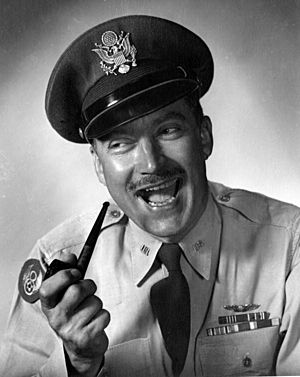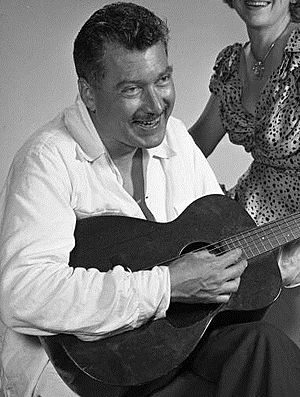MacKinlay Kantor facts for kids
Quick facts for kids
MacKinlay Kantor
|
|
|---|---|

Kantor in 1950
|
|
| Born | Benjamin McKinlay Kantor February 4, 1904 Webster City, Iowa, U.S. |
| Died | October 11, 1977 (aged 73) Sarasota, Florida, U.S. |
| Notable works | Andersonville (Pulitzer Prize) |
| Spouse | Florence Irene Layne |
| Children | 2 |

MacKinlay Kantor (born February 4, 1904 – died October 11, 1977) was an American writer. He worked as a journalist, wrote many novels, and also wrote for movies. He wrote more than 30 books. Many of his stories were about the American Civil War. In 1956, he won the important Pulitzer Prize for Fiction for his 1955 novel, Andersonville. He also wrote another famous Civil War novel called Gettysburg.
Contents
Early Life and Education
MacKinlay Kantor was born Benjamin McKinlay Kantor in Webster City, Iowa. He was the second child in his family and the only son. His mother, Effie Kantor, was the editor of the Webster City Daily News newspaper for some time. His father, John Martin Kantor, had trouble keeping jobs. MacKinlay's mother and children lived with her parents in Webster City.
As a child, he started using his middle name, McKinlay, as his first name. He changed the spelling to "MacKinlay" because he thought it sounded more Scottish. He liked to be called "Mack." He went to local schools and often said the Kendall Young Public Library was like his "university." He loved reading and learning there. MacKinlay won a writing contest with his first story, which was called "Purple."
Family Life
MacKinlay Kantor married Florence Irene Layne. They had two children together. Their son, Tim Kantor, wrote a book about his father called My Father's Voice: MacKinlay Kantor Long Remembered. His grandson, Tom Shroder, also wrote a biography about him titled The Most Famous Writer Who Ever Lived: A True Story of My Family.
Writing Career
Early Stories and Novels
From 1928 to 1934, Kantor wrote many stories for popular magazines to support his family. These included crime stories and mysteries. His first novel, Diversey, was published in 1928 and was set in Chicago.
In 1932, Kantor and his family moved to New Jersey. He continued to write many short stories for magazines. He also started writing for more popular, glossy magazines. His story "Rogue's Gallery," published in Collier's in 1935, became one of his most reprinted stories.
During this time, Kantor began writing about the American Civil War. His novel Long Remember (1934) was set during the Battle of Gettysburg. When he was young, Kantor loved listening to Civil War veterans tell their stories. He also collected many first-hand accounts from that time. His writing was even part of the literature event at the 1936 Summer Olympics art competition.
War Correspondent and Famous Films
During World War II, Kantor worked as a war correspondent in London. He flew on some bombing missions. He also interviewed many injured soldiers. Their experiences inspired one of his later novels.
After the war, a movie producer named Samuel Goldwyn asked him to write a movie script about soldiers returning home. Kantor wrote a novel called Glory for Me (1945). This book was later made into the famous movie The Best Years of Our Lives (1946). Kantor was disappointed because the movie's title was changed and some parts of his story were different. However, the film was a huge success and won seven Academy Awards.
In 1948, Kantor spent a lot of time researching with the New York City Police Department (NYCPD). He was allowed to ride along with police officers on their patrols. These experiences helped him write his crime novels, including Signal Thirty-Two (1950).
Kantor was known for using very little punctuation in his books, especially not using quotation marks. This style influenced other famous writers, like Cormac McCarthy.
Andersonville and Civil War Themes
In 1945, during World War II, Kantor entered the Buchenwald concentration camp when it was freed by U.S. troops. This experience deeply affected him. For the next ten years, he researched and wrote Andersonville (1955). This novel was about a Confederate prisoner of war camp during the Civil War called Andersonville. He won the Pulitzer Prize in 1956 for this important book.
Kantor often wrote about the American Civil War. He wrote two books for young readers about this time: Lee and Grant at Appomattox (1950) and Gettysburg (1952).
In 1960, Kantor published a fictional story in Look magazine called If the South Had Won the Civil War. This story imagined what would have happened if the South had won the Civil War. It was so popular that it was published as a book in 1961. His last novel was Valley Forge (1975).
Movies Based on His Works
Many of MacKinlay Kantor's novels were made into movies by other writers. He also wrote the movie script for Gun Crazy (1950). This film was based on his short story. Later, it was revealed that another writer, Dalton Trumbo, had secretly written the script. Trumbo was on the Hollywood blacklist at the time, meaning he was not allowed to work openly in Hollywood. Kantor gave his payment to Trumbo to help him.
Kantor also acted in one movie called Wind Across the Everglades (1958). The movie Follow Me, Boys! (1966) was based on his novel God and My Country.
Death
MacKinlay Kantor passed away from a heart attack in 1977 at his home in Sarasota, Florida. He was 73 years old.
Filmography
- Films
- The Voice of Bugle Ann (novel) (1936)
- Mountain Music (story) (1937)
- The Man from Dakota (novel, Arouse and Beware) (1940)
- Happy Land (novel) (1943)
- Gentle Annie (novel) (1944)
- The Best Years of Our Lives (novel, Glory for Me) (1946)
- The Romance of Rosy Ridge (novel) (1947)
- Gun Crazy (story and screenplay) (1950)
- Hannah Lee: An American Primitive (novel, Wicked Water) (1953)
- Wind Across the Everglades (actor) (1958)
- Follow Me, Boys! (novel, God and My Country) (1966)
- Television
- Lux Video Theatre, episode "Forever Walking Free" (story) (1951)
- Studio One in Hollywood, episode "Signal Thirty-Two" (novel) (1953)
- The 20th Century Fox Hour, episode "In Times Like These" (novel, Happy Land) (1956)
Legacy and Honors
- 1956: Won the Pulitzer Prize for his novel Andersonville.
- 1976: The Kantor-Mollenhoff Plaza in West Twin Park, Webster City, Iowa, was named in his honor. It also honored author Clark R. Mollenhoff.
- 1989: MacKinlay Kantor Drive in Webster City was named after him.
- His friend Richard Whiteman donated original copies of his more than 40 books to the Kendall Young Library in Webster City.
 | Kyle Baker |
 | Joseph Yoakum |
 | Laura Wheeler Waring |
 | Henry Ossawa Tanner |

